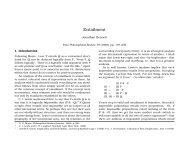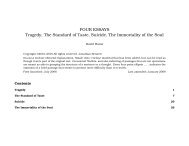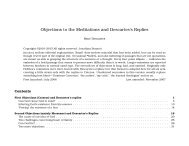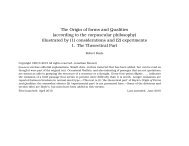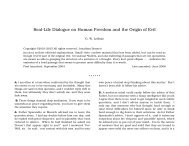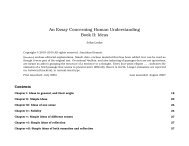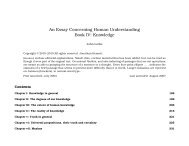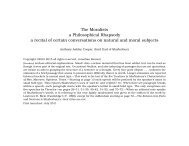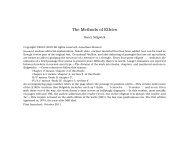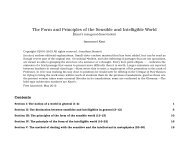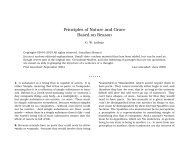A Vindication of the Rights of Woman with - Early Modern Texts
A Vindication of the Rights of Woman with - Early Modern Texts
A Vindication of the Rights of Woman with - Early Modern Texts
Create successful ePaper yourself
Turn your PDF publications into a flip-book with our unique Google optimized e-Paper software.
The <strong>Rights</strong> <strong>of</strong> <strong>Woman</strong> Mary Wollstonecraft 5: Pity bordering on contempt<br />
if virtue properly so-called must be based on knowledge,<br />
<strong>the</strong>n let us try to streng<strong>the</strong>n our minds by reflection, until<br />
our heads become a balance for our hearts; let us not<br />
confine all our thoughts to everyday trivial occurrences,<br />
or our knowledge to an acquaintance <strong>with</strong> our lovers’ or<br />
husbands’ hearts; ra<strong>the</strong>r, let <strong>the</strong> carrying-out <strong>of</strong> every duty<br />
be subordinate to <strong>the</strong> grand duty <strong>of</strong> improving our minds<br />
and preparing our affections for a more exalted state!. . . .<br />
If we really were created only to flutter our hour out<br />
and <strong>the</strong>n die, <strong>the</strong>n let us give full play to sensibility and<br />
laugh at <strong>the</strong> severity <strong>of</strong> reason! But even <strong>the</strong>n ·this wouldn’t<br />
be satisfactory, because· we wouldn’t have strong bodies<br />
or minds, and life would be lost in feverish pleasures or<br />
wearisome idleness.<br />
But <strong>the</strong> system <strong>of</strong> education that I earnestly want to see<br />
exploded seems to presuppose something that ought never<br />
to be taken for granted.<br />
·WHAT MW SAYS IN THE REST OF THIS PARAGRAPH·<br />
The presupposition has two parts. (1) A woman who is well<br />
brought up by <strong>the</strong> standards <strong>of</strong> <strong>the</strong> system I am attacking<br />
will be protected from any mishaps; Fortune, <strong>the</strong> blindfolded<br />
goddess, will take <strong>of</strong>f her blindfold and smile on this woman,<br />
bringing her an admirable male partner. (2) A woman who<br />
is devoted to virtue (and thus isn’t well brought up by those<br />
standards) will get benefits only to her own frame <strong>of</strong> mind;<br />
she is likely to have to cope <strong>with</strong> serious worldly difficulties,<br />
and to put up <strong>with</strong> <strong>the</strong> vices and moods <strong>of</strong> people she can<br />
never regard as friends.<br />
·HOW MW SAID THIS (VERBATIM)·<br />
. . . .namely, that virtue shields us from <strong>the</strong> casualties <strong>of</strong> life;<br />
and that fortune, slipping <strong>of</strong>f her bandage, will smile on a<br />
well-educated female, and bring in her hand an Émile or<br />
a Telemachus. Whilst, on <strong>the</strong> contrary, <strong>the</strong> reward which<br />
61<br />
virtue promises to her votaries is confined, it seems clear,<br />
to <strong>the</strong>ir own bosoms; and <strong>of</strong>ten must <strong>the</strong>y contend <strong>with</strong><br />
<strong>the</strong> most vexatious worldly cares, and bear <strong>with</strong> <strong>the</strong> vices<br />
and humours <strong>of</strong> relations for whom <strong>the</strong>y can never feel a<br />
friendship.<br />
[The next paragraph continues <strong>the</strong> statement <strong>of</strong> <strong>the</strong> ‘presupposition’<br />
that MW has been attacking, by saying more about <strong>the</strong> misfortunes <strong>of</strong><br />
(2) <strong>the</strong> woman who devotes herself to virtue.]<br />
Many women, instead <strong>of</strong> being supported by <strong>the</strong> reason<br />
and virtue <strong>of</strong> <strong>the</strong>ir fa<strong>the</strong>rs and bro<strong>the</strong>rs, have streng<strong>the</strong>ned<br />
<strong>the</strong>ir own minds by struggling <strong>with</strong> <strong>the</strong>ir vices and follies; but<br />
<strong>the</strong>y have never met <strong>with</strong> a hero in <strong>the</strong> shape <strong>of</strong> a husband.<br />
If <strong>the</strong>y did have a husband, he might. . . .manage to bring<br />
<strong>the</strong>ir reason back to its natural dependent state, and restore<br />
to man <strong>the</strong> privilege <strong>of</strong> rising above opinion—<strong>the</strong> privilege<br />
that had been usurped ·by <strong>the</strong> woman·.<br />
[•The second woman isn’t rewarded much by virtue, although she is<br />
devoted to it. The upshot for <strong>the</strong> first woman is better, and we understand<br />
its being brought by fortune, luck; but it’s not clear why in <strong>the</strong> verbatim<br />
passage it is also said to be worked by virtue. •In <strong>the</strong> second paragraph<br />
MW says that a husband might ‘pay <strong>the</strong> debt that mankind owed’ to <strong>the</strong><br />
woman. . . etc. But Rousseau & co. don’t think that mankind owes <strong>the</strong><br />
second woman anything. Perhaps MW meant ‘. . . paying <strong>the</strong> debt that<br />
<strong>the</strong> woman thinks mankind owes her’.]<br />
2: Fordyce<br />
[James Fordyce, a Scottish Presbyterian minister and poet,<br />
had written two enormously popular books about <strong>the</strong> upbringing<br />
<strong>of</strong> young women. MW makes no secret <strong>of</strong> her<br />
contempt for <strong>the</strong>se works—both for <strong>the</strong>ir overlap <strong>with</strong><br />
Rousseau’s views and for <strong>the</strong>ir style. He isn’t worth discussing,<br />
she says; but he has to be attended to because he<br />
is so influential. This section would run to about five pages,



